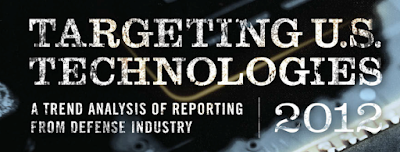I get a lot of strange questions.
This one was particularly intriguing.
Answer
For now, this appears to be an urban legend.
However, developing a technique to do this is on their radar screen...
"As U.S. financial institutions continue to improve legislation that reduces money laundering, criminals with large quantities of cash have shifted their focus to bulk currency smuggling, making deposits in foreign banks. Current DHS and law enforcement technologies catch only a fraction of the currency passing through the ports and borders. To date, a dedicated currency detector has never been developed. Lattice Government Services (LGS) will work with the University of Washington to define requirements and a Concept of Operations, research gaseous chemical detection, and physical spectral/magnetic detection technologies, and down select ideal systems..." (more)
From the fine state that brought you the light bulb, tetracycline, the visible-light lasers, bubble wrap, oral ACE inhibitors and the TV dinner...
"Paul Burgess, the chief executive of New Jersey-based Lattice Inc, the parent of Lattice Government Services, described challenges: “it isn’t just currency moving through an airport, a body scanner will pick that up. The bigger problem is at border crossings. You can put money in a side door and it’s going to be very difficult to detect."
As of May, 2011 we know that...
"DHS will soon begin reviewing the companies’ reports to decide whether there are any ideas worth pursuing, Verrico said. If the agency decides to move forward, one or more prototypes will be built and field-tested. “We will evaluate them over the next 30 to 60 days before we make any further decisions on ‘phase two,’” he said.” (more)
Stay tuned.
Personally, I think money detection will eventually be accomplished by embedding micro-RFID chips into the paper. Of course, the countermeasure would then be to carry money in a shielded container or wallet.
Perhaps "smell" is the answer. Dogs are slow and scarce. But, these problems are being worked out...
"Tai Hyun Park and Seunghun Hong, of Seoul National University, with their colleagues, recreated a simplified version of the detecting cells in a dog’s nose using tiny bubbles made from cell membrane."
 They are working on artificial noses in Japan and Germany, too. You can buy an electronic nose today from Alpha MOS, but it is not portable enough for sniffing out money. The Cyranose 320 is portable but doesn't know what money smells like. We'll check back with you folks later.
They are working on artificial noses in Japan and Germany, too. You can buy an electronic nose today from Alpha MOS, but it is not portable enough for sniffing out money. The Cyranose 320 is portable but doesn't know what money smells like. We'll check back with you folks later.Got any ideas for money detection?
Send them (along with a case of M&M's) to:
"Show me the money!"
PO Box 668
Oldwick, NJ 08858









































